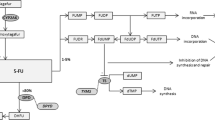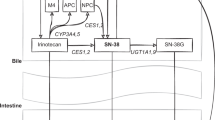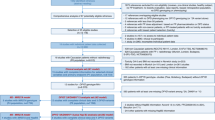Abstract
Background
Serious and potentially life-threatening toxicities can occur following 5-fluorouracil/capecitabine exposure. Patients carrying Dihydropyrimidine Dehydrogenase (DPYD) variant alleles associated with decreased enzymatic function are at a greater risk of early/severe 5-fluorouracil/capecitabine toxicity. The objective of this systematic review/meta-analysis was to evaluate treatment outcomes between Pharmacogenetics Guided Dosing (PGD) versus non-PGD and within PGD (DPYD variant allele carriers versus wild type).
Methods
A systematic review/meta-analysis of original publications indexed in Ovid Medline, Ovid Embase, and the Cochrane CENTRAL (Wiley) library from inception to 7-Dec-2020. Eligible studies evaluated at least one pre-defined treatment outcome measures (toxicity/hospitalisations/survival/overall response/quality of life).
Results
Of 1090 identified publications, 17 met predefined eligibility criteria. The meta-analysis observed reduced incidence of grade 3/4 overall toxicity (Risk Ratio [RR] 0.32 [95% Cl 0.27–0.39], p < 0.00001) and grade 3/4 diarrhoea (RR 0.38 [95% Cl 0.24–0.61], p < 0.0001) among PGD versus non-PGD cohorts. Within PGD cohorts, there was no statistical differences for overall response rates (complete/partial) (RR 1.31 [95% Cl 0.93–1.85], p = 0.12). Similar results were found with stable disease (RR 1.27 [95% Cl 0.66–2.44], p = 0.47).
Conclusion
PGD improves patient outcomes in terms of grade 3/4 toxicity, in particular overall toxicity and diarrhoea, without impacting on treatment response.
Registration number
The study is registered with PROSPERO, registration number CRD42020223768.
This is a preview of subscription content, access via your institution
Access options
Subscribe to this journal
Receive 24 print issues and online access
$259.00 per year
only $10.79 per issue
Buy this article
- Purchase on Springer Link
- Instant access to full article PDF
Prices may be subject to local taxes which are calculated during checkout



Similar content being viewed by others
Data availability
All data generated or analysed during this study are included in this published article [and its Supplementary information files].
References
Dean L. Fluorouracil therapy and DPYD genotype. National Center for Biotechnology Information 2012.
van Kuilenburg AB, Hausler P, Schalhorn A, Tanck MW, Proost JH, Terborg C, et al. Evaluation of 5-fluorouracil pharmacokinetics in cancer patients with a c.1905+1G>A mutation in DPYD by means of a Bayesian limited sampling strategy. Clin Pharmacokinetics. 2012;51:163–74.
Froehlich TK, Amstutz U, Aebi S, Joerger M, Largiader CR. Clinical importance of risk variants in the dihydropyrimidine dehydrogenase gene for the prediction of early-onset fluoropyrimidine toxicity. Int J Cancer. 2015;136:730–9.
Thorn CF, Marsh S, Carrillo MW, McLeod HL, Klein TE, Altman RB. PharmGKB summary: fluoropyrimidine pathways. Pharmacogenet Genomics. 2011;21:237–42.
Ma WW, Saif MW, El-Rayes BF, Fakih MG, Cartwright TH, Posey JA, et al. Emergency use of uridine triacetate for the prevention and treatment of life-threatening 5-fluorouracil and capecitabine toxicity. Cancer 2017;123:345–56.
Diasio RB, Beavers TL, Carpenter JT. Familial deficiency of dihydropyrimidine dehydrogenase. Biochemical basis for familial pyrimidinemia and severe 5-fluorouracil-induced toxicity. J Clin Invest. 1988;81:47–51.
European Society for Medical OncologyEMA Starts Review on Screening Patients Before Treatment with Fluorouracil, Capecitabine, Tegafur and Flucytosine [Internet]. Ginevra Lugano (USA): ESMO; 2019 Mar 21 [cited 2021 Jul 28]. Available from: https://www.esmo.org/oncology-news/EMA-Starts-Review-on-Screening-Patients-Before-Treatment-with-Fluorouracil-Capecitabine-Tegafur-and-Flucytosine.
Takimoto CH, Lu ZH, Zhang R, Liang MD, Larson LV, Cantilena LR Jr, et al. Severe neurotoxicity following 5-fluorouracil-based chemotherapy in a patient with dihydropyrimidine dehydrogenase deficiency. Clin Cancer Res. 1996;2:477–81.
Ezzeldin H, Diasio R. Dihydropyrimidine dehydrogenase deficiency, a pharmacogenetic syndrome associated with potentially life-threatening toxicity following 5-fluorouracil administration. Clin Colorectal Cancer. 2004;4:181–9.
van Kuilenburg AB, Haasjes J, Richel DJ, Zoetekouw L, Van Lenthe H, De, et al. Clinical implications of dihydropyrimidine dehydrogenase (DPD) deficiency in patients with severe 5-fluorouracil-associated toxicity: identification of new mutations in the DPD gene. Clin Cancer Res. 2000;6:4705–12.
Henricks LM, Lunenburg C, de Man FM, Meulendijks D, Frederix GWJ, Kienhuis E, et al. DPYD genotype-guided dose individualisation of fluoropyrimidine therapy in patients with cancer: a prospective safety analysis. Lancet Oncol. 2018;19:1459–67.
Amstutz U, Henricks LM, Offer SM, Barbarino J, Schellens JHM, Swen JJ, et al. Clinical Pharmacogenetics Implementation Consortium (CPIC) Guideline for Dihydropyrimidine Dehydrogenase Genotype and Fluoropyrimidine Dosing: 2017 Update. Clin Pharm Ther. 2018;103:210–6.
Food and Drug Administration. Table of Pharmacogenetic Associations [Internet]. United States: FDA; 2021 May [cited 28 July 2021]. Available from: https://www.fda.gov/medical-devices/precision-medicine/table-pharmacogenetic-associations.
The Medicines and Healthcare products Regulatory Agency (MHRA). Drug safety update [Internet]. United Kingdom: MHRA; 2020 [updated 2020 Oct 03; cited 2021 May 25]. Available from Oct-2020-DSU-PDF.pdf (publishing.service.gov.uk).
Boisdron-Celle M, Capitain O, Faroux R, Borg C, Metges JP, Galais MP, et al. Prevention of 5-fluorouracil-induced early severe toxicity by pre-therapeutic dihydropyrimidine dehydrogenase deficiency screening: assessment of a multiparametric approach. Semin Oncol. 2017;44:13–23.
Deenen MJ, Meulendijks D, Cats A, Sechterberger MK, Severens JL, Boot H, et al. Upfront genotyping of DPYD*2A to individualize fluoropyrimidine therapy: a safety and cost analysis. J Clin Oncol. 2016;34:227–34.
Moher D, Shamseer L, Clarke M, Ghersi D, Liberati A, Petticrew M, et al. Preferred reporting items for systematic review and meta-analysis protocol (PRISMA-P) 2015 statement. Syst Rev. 2015;4:1.
Wells GA, Shea B, O’Connell D, Peterson J, Welch V, Losos M, et al. The Newcastle-Ottawa Scale (NOS) for assessing the quality of nonrandomised studies in meta-analyses. 2021.
Lunenburg C, Henricks LM, Dreussi E, Peters FP, Fiocco M, Meulendijks D, et al. Standard fluoropyrimidine dosages in chemoradiation therapy result in an increased risk of severe toxicity in DPYD variant allele carriers. Eur J Cancer. 2018;104:210–8.
Henricks LM, Lunenburg CATC, de Man FM, Meulendijks D, Frederix GWJ, Kienhuis E, et al. A cost analysis of upfront DPYD genotype-guided dose individualisation in fluoropyrimidine-based anticancer therapy. Eur J Cancer. 2019;107:60–7.
Jolivet C, Nassabein R, Soulieres D, Weng X, Amireault C, Ayoub JP, et al. Implementing DPYD 2A genotyping in clinical practice: The Quebec (Canada) experience. Oncologist. 2020;04:04.
Patil V, Noronha V, Joshi A, Zanwar S, Ramaswamy A, Arya S, et al. Dihydropyrimidine dehydrogenase mutation in neoadjuvant chemotherapy in head and neck cancers: Myth or reality? South Asian J Cancer. 2016;5:182–5.
Sahu A, Ramaswamy A, Ostwal V. Dihydro pyrimidine dehydrogenase deficiency in patients treated with capecitabine based regimens: a tertiary care centre experience. J Gastrointest Oncol. 2016;7:380–6.
Yang CG, Ciccolini J, Blesius A, Dahan L, Bagarry-Liegey D, Brunet C, et al. DPD-based adaptive dosing of 5-FU in patients with head and neck cancer: Impact on treatment efficacy and toxicity. Cancer Chemother Pharmacol. 2011;67:49–56.
Kleinjan JP, Brinkman I, Bakema R, Van Zanden JJ, Van Rooijen JM. Tolerance-based capecitabine dose escalation after DPYD genotype-guided dosing in heterozygote DPYD variant carriers: A single-center observational study. Anti-Cancer Drugs. 2019;30:410–5.
Launay M, Dahan L, Duval M, Duval M, Milano G, Rodallec A, et al. Beating the odds: efficacy and toxicity of dihydropyrimidine dehydrogenase-driven adaptive dosing of 5-FU in patients with digestive cancer. Br J Clin Pharmacol. 2015;81:124–30.
Launay M, Ciccolini J, Fournel C, Blanquicett C, Dupuis C, Fakhry N, et al. Upfront DPD deficiency detection to secure 5-FU administration: Part 2-application to head-and-neck cancer patients. Clin Cancer Drugs 2017;4:122–8.
Stavraka C, Pouptsis A, Okonta L, DeSouza K, Charlton P, Kapiris M, et al. Clinical implementation of pre-treatment DPYD genotyping in capecitabine-treated metastatic breast cancer patients. Breast Cancer Res Treat. 2019;175:511–7.
Boisdron-Celle M, Metges JP, Capitain O, Adenis A, Raoul JL, Lecomte T, et al. A multicenter phase II study of personalized FOLFIRI-cetuximab for safe dose intensification. Semin Oncol 2017;44:24–33.
Lunenburg CA, van Staveren MC, Gelderblom H, Guchelaar HJ, Swen JJ. Evaluation of clinical implementation of prospective DPYD genotyping in 5-fluorouracil- or capecitabine-treated patients. Pharmacogenomics. 2016;17:721–9.
Magnani E, Farnetti E, Nicoli D, Casali B, Savoldi L, Focaccetti C, et al. Fluoropyrimidine toxicity in patients with dihydropyrimidine dehydrogenase splice site variant: the need for further revision of dose and schedule. Intern Emerg Med. 2013;8:417–23.
Schünemann H BeJ, Guyatt G, Oxman A, eds. GRADE Handbook [Internet]. 2013 [cited 18 Novemeber 2021]. Available from: https://gdt.gradepro.org/app/handbook/handbook.html.
Higgins JPT, Thomas J, Chandler J, Cumpston M, Li T, Page MJ, et al. (editors). Cochrane Handbook for Systematic Reviews of Interventions FiInternet]. 2021[updated 2021 February, cited 05 January 2021]. Available from: www.training.cochrane.org/handbook.
Acknowledgements
Not applicable.
Funding
The authors received no specific funding for this work.
Author information
Authors and Affiliations
Contributions
SG: conducted data screening, extractions, reviewing of articles, assessing risk of bias, methodology, writing original draft preparation. MA: overseeing data screening, extractions, reviewing of articles, assessing risk of bias, writing, reviewing and editing. MNHK: conducted data screening, extractions, reviewing of articles, assessing risk of bias, writing parts of original draft. AB: conducted data screening, extractions, reviewing of articles, assessing risk of bias, writing parts of original draft. Smaro Lazarakis: data sourcing, developed search strategy, methodology. JM: writing, reviewing and editing. JT: writing, reviewing and editing. Senthil Lingaratnam: writing, reviewing and editing. MM: overseeing data screening, extractions, reviewing of articles, assessing risk of bias, writing, reviewing and editing.
Corresponding author
Ethics declarations
Competing interests
The authors declare no competing interests.
Ethics approval and consent to participate
Not applicable.
Consent to publish
Not applicable.
Additional information
Publisher’s note Springer Nature remains neutral with regard to jurisdictional claims in published maps and institutional affiliations.
Supplementary information
Rights and permissions
About this article
Cite this article
Glewis, S., Alexander, M., Khabib, M.N.H. et al. A systematic review and meta-analysis of toxicity and treatment outcomes with pharmacogenetic-guided dosing compared to standard of care BSA-based fluoropyrimidine dosing. Br J Cancer 127, 126–136 (2022). https://doi.org/10.1038/s41416-022-01779-6
Received:
Revised:
Accepted:
Published:
Issue Date:
DOI: https://doi.org/10.1038/s41416-022-01779-6



